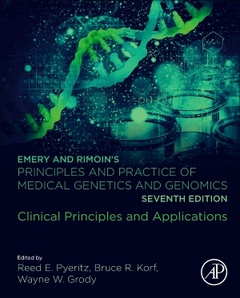Description
Emery and Rimoin’s Principles and Practice of Medical Genetics and Genomics (7th Ed.)
Clinical Principles and Applications
Coordinators: Pyeritz Reed E., Korf Bruce R., Grody Wayne W.
Language: English
Keywords
Aarskog syndrome; Adverse effects; Allotransplantation; Antenatal screening; Applications; Autism; Beckwith-Wiedemann syndrome; Benign allele; Birth defects; Bloom syndrome; Bone marrow therapy (BMT)Enzyme replacement therapy (ERT)Gene therapy; Brachmann-de Lange syndrome; Carrier screening; Chromosome banding; Chromosome microarray analysis (CMA)Chromosomes; Chromosome; Clinical decision support; Coffin-Siris syndrome; Cohesinopathies; Comparative genomic hybridization; Confidentiality; Consent; Copy number variation; Counseling; Cytogenetics; Deformation; Developing countries; Developmental disability; Disruption; Donohue (leprechaunism) syndrome; Donor/Recipient matching; Donor-specific antibody; Dubowitz syndrome; Dysplasia; education; Electronic health record; Elejalde syndrome; Etiology; Evidence-based medicine; Expanded carrier screening; Exposures; Fanconi pancytopenia syndrome; Floating Harbor syndrome; Fluorescence in situ hybridization (FISH)Next-generation sequencing; Genetic counseling; Genetic heterogeneity; Genetics; Genome editing
412 p. · 19x23.3 cm · Hardback
Description
/li>Contents
/li>Readership
/li>Biography
/li>Comment
/li>
1. A Clinical Approach to the Dysmorphic Child 2. Clinical Teratology 3. Neurodevelopmental Disabilities: Global Developmental Delay, Intellectual Disability, and Autism 4. Abnormal Body Size and Proportion 5. Cytogenetic Analysis 6. Diagnostic Molecular Genetics 7. Therapies for Lysosomal Storage Diseases 8. Transplantation Genetics 9. Genetic Evaluation for Common, Chronic Disorders of Adulthood 265 10. Carrier Screening and Heterozygote Testing 11. Circadian Rhythms and Disease 12. The Genomic Health Record: Current Status and Vision for the Future 13. Ethical and Social Issues in Clinical Genetics 14. Genetics and Genomics in Public Health 15. Implementation of Genomic Medicine: An International Perspective
Students, physicians, and researchers in the field of medical genetics and personalized medicine; medical practitioners across medical disciplines as well as systems biology, molecular medicine, and genetic epidemiology; genetic counselors; genetic researchers in industry and pharma
Bruce R. Korf is the director of the Heflin Center for Human Genetics and chairman of the Department of Genetics at the University of Alabama at Birmingham. In April 2009, he began a two-year term as president of the American College of Medical Genetics (ACMG). Korf received his M.D. from Cornell University Medical College and his Ph.D. in genetics and cell biology from Rockefeller University. He completed a residency in pediatrics, pediatric neurology, and genetics at Children's Hospital, Boston. Prior to his appointment at the University of Alabama, he served as clinical director in the Division of Genetics at Children's Hospital from 1986 to 1999, and as the medical director of the Harvard-Partners Center for Genetics and Genomics fr
- Fully revised and up-to-date, this new edition introduces genetic researchers, students, and health professionals to general principles of genetic counseling, genetic and genomic diagnostics, treatment pathways, drug discovery, and the application of genomic technologies, analytics, and therapeutics in clinical practice
- Examines key topics and developing areas within clinical genomics, including genetic evaluation of patients, clinical trials and drug discovery, genetic health records, cytogenetic analysis, diagnostic molecular genetics, small molecule genetic therapeutics, gene product replacement, clinical teratology, transplantation genetics, and ethical and legal aspects of genomic medicine
- Includes color images supporting identification, concept illustration, and method processing
- Features contributions by leading international researchers and practitioners of medical genetics




